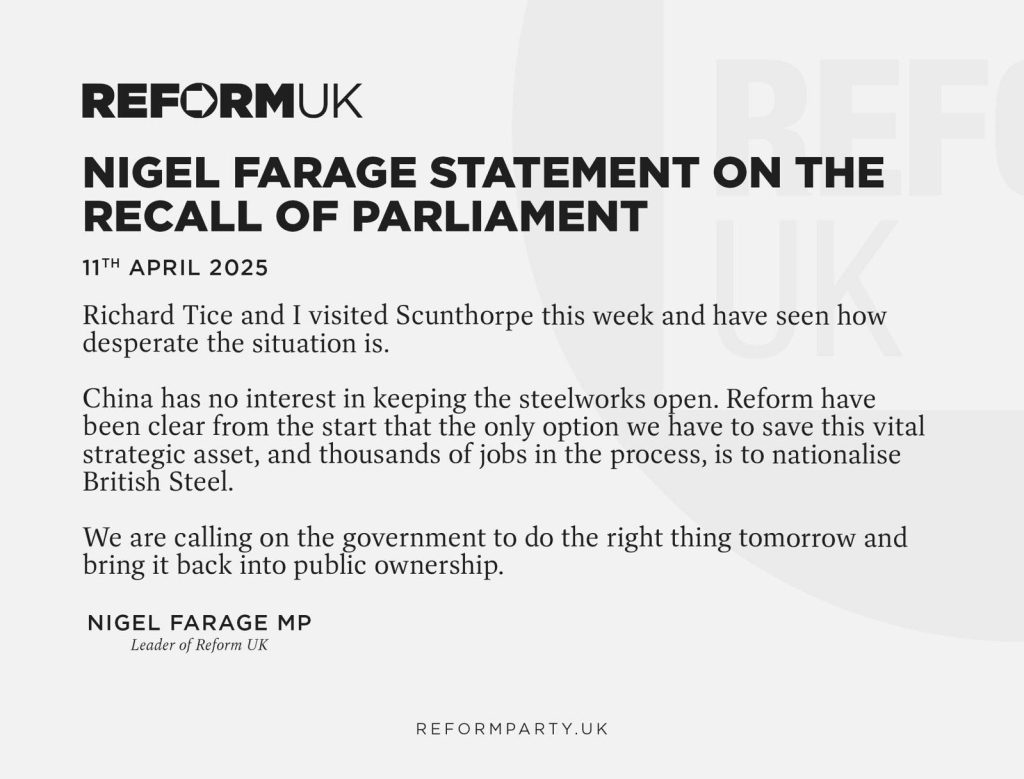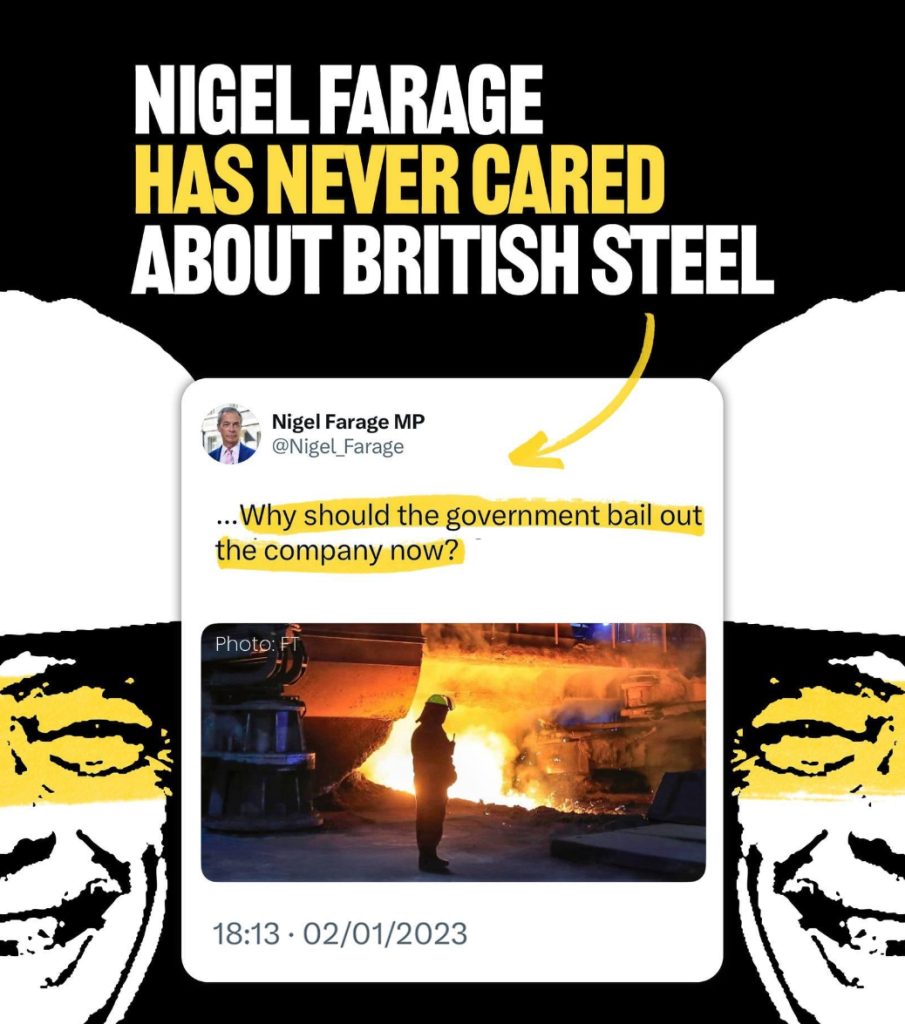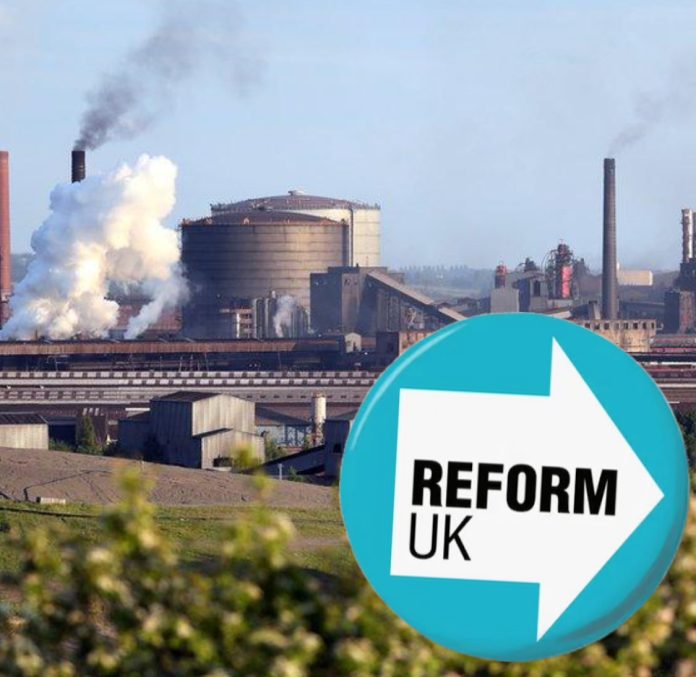In a twist that would have been unthinkable just a few years ago, Reform UK, the party that once championed free markets, deregulation, and the invisible hand of enterprise, is now calling for the full nationalisation of British Steel.
Yes, you read that correctly.
2025:

2023:

The self-styled heirs to Thatcherism, born out of the Brexit revolt against “big government” and overreach, are now cheerleading for state ownership of heavy industry. In their scramble to capitalise on the crisis at Scunthorpe, Reform UK are happily tossing free market orthodoxy into the nearest blast furnace.
On the surface, it looks like sharp political instinct. With the government reluctantly forcing itself into British Steel’s corporate affairs and Labour hesitating to take the plunge into full nationalisation, Reform sees an opportunity to leap ahead. They are positioning themselves as the only party brave enough to rescue a cornerstone of Britain’s industrial past, to keep the fires burning — both literally and metaphorically — in the steel towns that feel forgotten.
But this is no small ideological pivot. For a party built on small-state, free-market principles, this demand for full-blown nationalisation amounts to intellectual heresy. They are, in effect, proposing that the state take not just a seat at the table but full ownership of the house. Once an advocate of letting the market decide winners and losers, Reform is now embracing the language of industrial strategy and state interventionism with remarkable enthusiasm.
What does this tell us?
First, it reveals Reform’s ruthless pragmatism. They sense, rightly, that for many communities like Scunthorpe, abstract ideals of market efficiency are cold comfort when livelihoods are at stake. In towns where the collapse of industry has hollowed out hope, the promise of state-backed security trumps free market dogma every time.
Second, it underscores a broader political realignment. The old dividing lines between left and right, market and state, are blurring rapidly. Reform’s position on British Steel shows that economic nationalism is the new battleground — and they are more than willing to weaponise it.
There is also a clear populist thread. By accusing both Labour and the Conservatives of half-measures, Reform UK can style itself as the true voice of the people, unshackled by ideological purity. Their message is simple: British industry should belong to the British people, not distant multinational corporations or hesitant Westminster bureaucrats.
Yet, there’s a glaring irony here. The same party that rails against state intervention in most areas of life, from climate policy to public health, is now begging for the state to take command of a loss-making steelworks. It raises a legitimate question: if Reform UK is prepared to nationalise steel, what else might they want the government to take over? Where does this new appetite for intervention end?
Critics will argue that this is opportunism, not principle; a populist pivot dressed up as patriotism. After all, full nationalisation will come with eye-watering costs to the taxpayer, not to mention the immense challenge of modernising an industry under pressure from green transition demands and global competition.
But for Reform UK, these are secondary concerns. The political prize is too tempting to resist. In steel towns where trust in the free market has long since evaporated, a promise of nationalisation may well strike the right chord.
Reform’s gamble is clear: abandon free market purism in favour of a muscular, state-led industrial policy — and hope voters reward them for it.
Whether this new direction is a principled rethinking or a moment of pure political convenience remains to be seen. But one thing is undeniable: Reform UK is no longer the party of free market fundamentalism. The winds have shifted, and they are sailing hard with the political tide.







